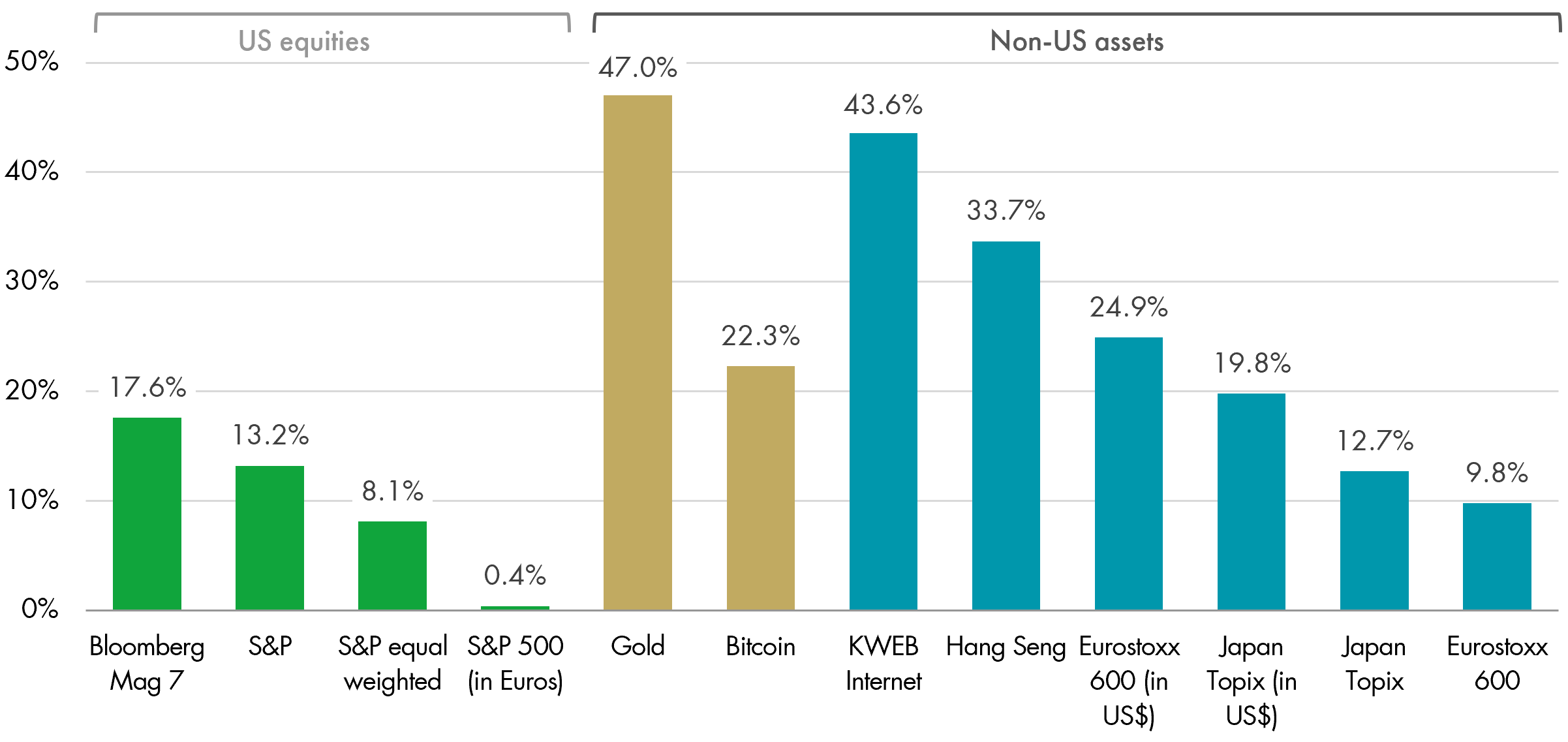This article is featured in the Q3 2025 Future Strategist newsletter, you can read the rest of the newsletter here.
American exceptionalism reasserted itself in the third quarter of 2025 after six months of rotation away from both the Magnificent 7 (Mag 7) and the US equity market. Driven by a significant pickup in AI investment news flow, the animal spirits were back out in force. Nothing showed this more so than the announcement from Oracle that they had obligations for infrastructure assets that increased by 359% to $455 billion. This was a multiple of the expected value and shares of Oracle rallied 26.5% on the day, adding hundreds of billions to its market capitalisation and briefly projecting Larry Ellison into the position of the richest man in the world.
The S&P 500 rose 7.4% in the third quarter; the Goldman Sachs AI basket was up 15.9% and the Bloomberg Mag 7 index up 17.6%. Markets outside the US also continued to do well excluding Europe, which took a pause. China, as measured by the KWEB Internet Index, was up 22.2% and Japan rose 8.4%.
The surge in US tech performance in the third quarter reversed a chunk of the outperformance by other sectors and markets in the first half year of 2025, but the weak dollar year to date (-10% versus the euro) still leaves the S&P 500 in euro terms flat year to date. This means that non-US dollar investors have struggled to get the required returns from the US market.
Within the global equities universe, both year-to-date and third-quarter trends show that the dispersion of returns across sectors has been much less marked. Communication Services (including Meta and Alphabet) and Information Technology lead the year-to-date numbers at 27% and 24% respectively but Industrials, Materials and Financials are not far behind; there were plenty of opportunities outside the most talked about themes.
Dispersion within sectors has increased and this clearly supports the case for diversification. Among single stocks, losers were focused on clear baskets, with the advertising sector seeing Trade Desk and WPP down over 50% each as the dominance of the AI consolidators, Meta in particular, continued. The trend to the weaker mid-to-low-end consumer saw Lululemon and Deckers also down over 50% year to date. The rise of the AI trade in China has delivered strong performance from beaten down names – the BAT trade (Baidu, Alibaba, Tencent) has seen these three names up +56%, +110% and +47%.
Asset price moves – year to end September 2025

Source: Bloomberg, Liontrust, 30 September 2025. Past performance does not predict future returns.
Geopolitical risks continued to mount during the quarter, as well as concerns over rates of growth, interest rates and debt levels in the US economy. This served to feed the continued flight to safe haven assets like gold, which is up 47% in 2025, its best performance in the last 46 years!
As the chart above reinforces, the playing field has been more level in 2025, allowing plenty of investment opportunities outside the Mag 7 names, making the application of Modern Portfolio Theory far more appealing.
KEY RISKS
Past performance does not predict future returns. You may get back less than you originally invested.
We recommend this fund is held long term (minimum period of 5 years). We recommend that you hold this fund as part of a diversified portfolio of investments.
The Funds managed by the Global Equities Team:
- May hold overseas investments that may carry a higher currency risk. They are valued by reference to their local currency which may move up or down when compared to the currency of a Fund.
- May encounter liquidity constraints from time to time. The spread between the price you buy and sell shares will reflect the less liquid nature of the underlying holdings.
- May invest in smaller companies and may invest a small proportion (less than 10%) of the Fund in unlisted securities. There may be liquidity constraints in these securities from time to time, i.e. in certain circumstances, the fund may not be able to sell a position for full value or at all in the short term. This may affect performance and could cause the fund to defer or suspend redemptions of its shares.
- May have a concentrated portfolio, i.e. hold a limited number of investments or have significant sector or factor exposures. If one of these investments or sectors / factors fall in value this can have a greater impact on the Fund's value than if it held a larger number of investments across a more diversified portfolio.
- May invest in emerging markets which carries a higher risk than investment in more developed countries. This may result in higher volatility and larger drops in the value of a fund over the short term.
Certain countries have a higher risk of the imposition of financial and economic sanctions on them which may have a significant economic impact on any company operating, or based, in these countries and their ability to trade as normal. Any such sanctions may cause the value of the investments in the fund to fall significantly and may result in liquidity issues which could prevent the fund from meeting redemptions. - May invest in companies predominantly in a single country which maybe subject to greater political, social and economic risks which could result in greater volatility than investments in more broadly diversified funds.
- May hold Bonds. Bonds are affected by changes in interest rates and their value and the income they generate can rise or fall as a result; The creditworthiness of a bond issuer may also affect that bond's value. Bonds that produce a higher level of income usually also carry greater risk as such bond issuers may have difficulty in paying their debts. The value of a bond would be significantly affected if the issuer either refused to pay or was unable to pay.
- May, in certain circumstances, invest in derivatives but it is not intended that their use will materially affect volatility. Derivatives are used to protect against currencies, credit and interest rate moves or for investment purposes. The use of derivatives may create leverage or gearing resulting in potentially greater volatility or fluctuations in the net asset value of the Fund. A relatively small movement in the value of a derivative's underlying investment may have a larger impact, positive or negative, on the value of a fund than if the underlying investment was held instead.
The risks detailed above are reflective of the full range of Funds managed by the Global Equities Team and not all of the risks listed are applicable to each individual Fund. For the risks associated with an individual Fund, please refer to its Key Investor Information Document (KIID)/PRIIP KID."
The issue of units/shares in Liontrust Funds may be subject to an initial charge, which will have an impact on the realisable value of the investment, particularly in the short term. Investments should always be considered as long term.
DISCLAIMER
This material is issued by Liontrust Investment Partners LLP (2 Savoy Court, London WC2R 0EZ), authorised and regulated in the UK by the Financial Conduct Authority (FRN 518552) to undertake regulated investment business.
It should not be construed as advice for investment in any product or security mentioned, an offer to buy or sell units/shares of Funds mentioned, or a solicitation to purchase securities in any company or investment product. Examples of stocks are provided for general information only to demonstrate our investment philosophy. The investment being promoted is for units in a fund, not directly in the underlying assets.
This information and analysis is believed to be accurate at the time of publication, but is subject to change without notice. Whilst care has been taken in compiling the content, no representation or warranty is given, whether express or implied, by Liontrust as to its accuracy or completeness, including for external sources (which may have been used) which have not been verified.
This is a marketing communication. Before making an investment, you should read the relevant Prospectus and the Key Investor Information Document (KIID) and/or PRIIP/KID, which provide full product details including investment charges and risks. These documents can be obtained, free of charge, from www.liontrust.com or direct from Liontrust. If you are not a professional investor please consult a regulated financial adviser regarding the suitability of such an investment for you and your personal circumstances.

Mark Hawtin
Mark Hawtin is head of the Global Equities team. Mark joined Liontrust in 2024 from GAM, where he was an Investment Director running global long-only and long/short funds investing in the disruptive growth & technology sectors. Before joining GAM in 2008 he was a partner and portfolio manager with Marshall Wace Asset Management for eight years, managing one of Europe’s largest technology, media and telecoms hedge funds.

